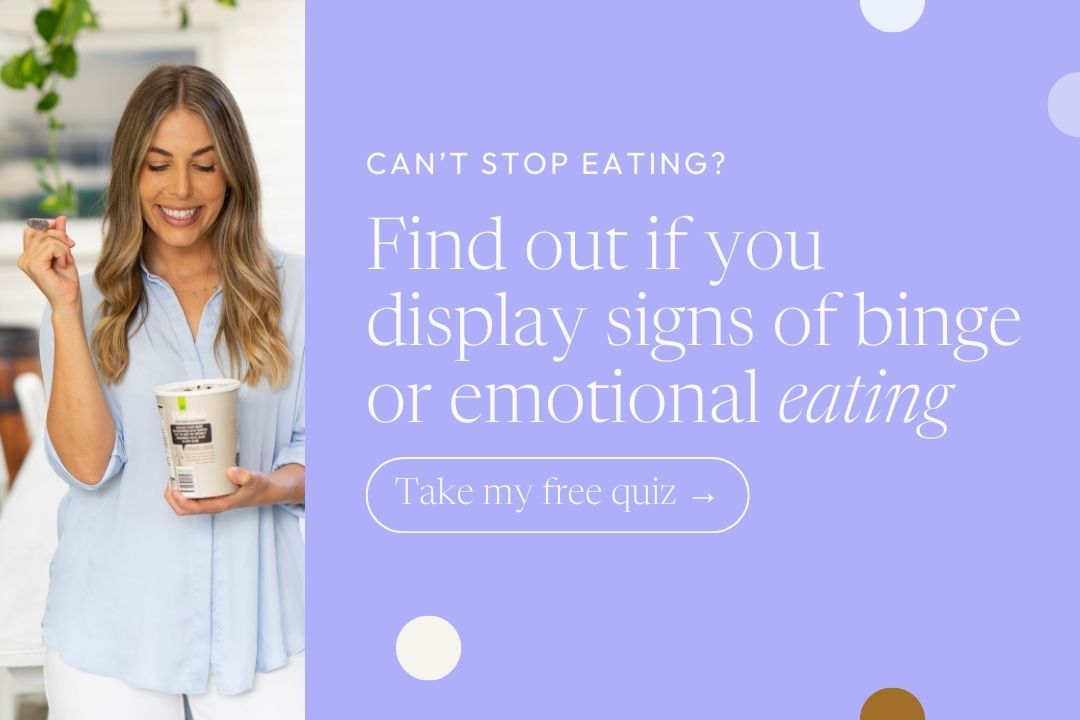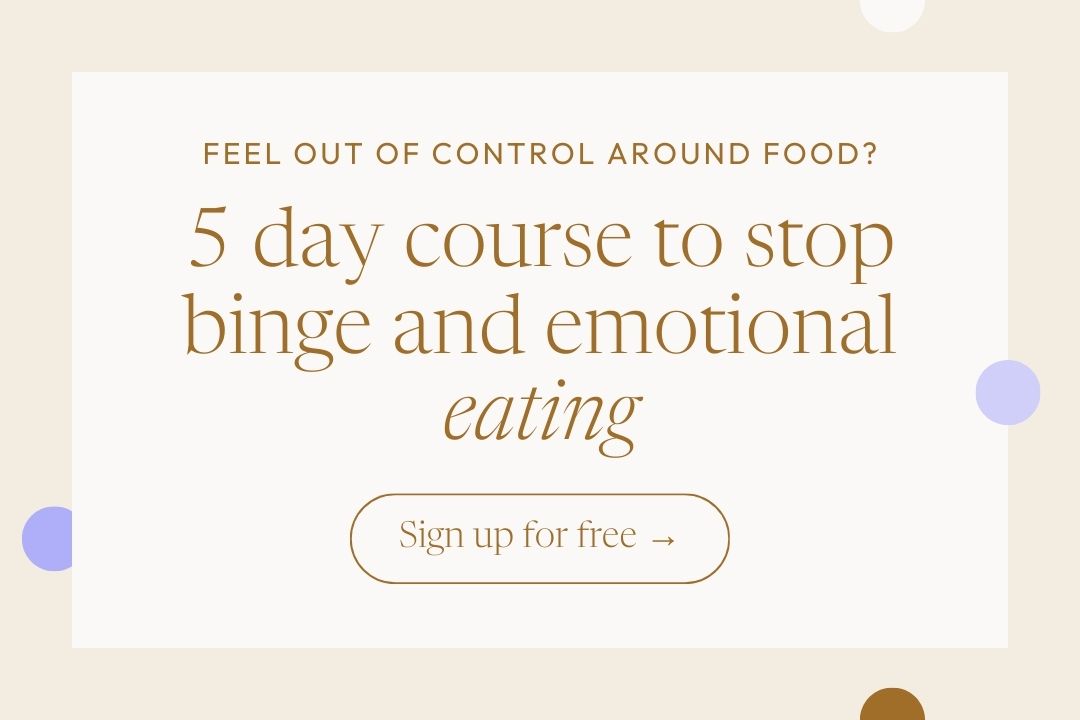Thinking about food when you’re hungry or making cooking plans is completely normal. But thinking about food constantly? That may be a sign something is up. If you find you can’t stop thinking about food, this might help.
We eat for two reasons: fuel or pleasure. Think about this. You have a big presentation at 2pm, so it’s important you’re firing and thinking clearly. Having a balanced lunch beforehand helps – eating for fuel. Then sometimes you eat for pleasure. Consider a slice of birthday cake or special foods at Christmas time and the shared ritual of eating them. That’s enjoyment.
Figuring out how to stop thinking about food means understanding why you’re thinking about it. Remember this: foods have different nutritional value, not different moral value. That’s what diet culture has made us mistakenly assign to them.

And gee, do I understand that. At age 11, I was made to be scared of pasta, eating carrot noodles, way before zoodles were even a thing. I started a food tracker, writing down everything I ate, obsessing over every mouthful. For more than a decade, if I followed my regimen, I was fine. But if I was compelled to break my dieting rules, I felt irrationally unhappy and anxious. And I never lost the weight I was so desperate to (or I did temporarily only to regain it, plus more).
Losing 20kg came when I finally channelled a fraction of the time and effort I’d spend at the gym and counting almonds, into developing a healthier relationship with food and my body.
Here are my tips to help you shift your focus, too.
1. Have all the things
Leave the judgment at the door and skip the guilt, not meals. There’s no “making up for” or “earning” food. Instead of dodging carbs, dodge food stress. Focus on what you can have. Perhaps one of the reasons you’re constantly thinking about food is because you have created rules about what it ‘good’ or ‘allowed’ in your diet.
If there’s a certain food you think about more than others, don’t eliminate it completely. Instead, eat it. You’ll likely stop fixating on it (read more about the big problem with portion control), because you’ve given yourself permission to enjoy it. Mine is chocolate and I have it every morning on my cappuccino.

2. You need to eat more
It might sound counterproductive, by hear me out – especially if your find you’re constantly thinking about food. Does this pattern sound familiar? You eat really well during the day, but as soon as you get home after a busy day – the eating starts – and then you feel like you can’t stop until you’ve eaten the entire pantry? Chances are you’re not allowing yourself to eat enough during the day.
Perhaps, you’re ‘trying to be good’ to make up for the fact that you couldn’t stop eating yesterday… and the day before. But in doing so, you’re simply perpetuating this negative cycle. You can’t get control over your eat but ‘trying to be good’ or eating less. If you’re constantly thinking about food or feel out of control around food, then chances are you need to allow yourself to eat more. And I don’t mean more carrot sticks or sad salad. You need to eat food that feels truly satisfying.
By the way…have you downloaded my FREE meal plan yet? It might be different from any meal plan you’ve seen before.
3. Do just one thing while eating
Distracted eating is one way of disconnecting from feelings of guilt or shame about what you’re eating, how you’re eating it, how you feel about your body and yourself. That’s why it’s helpful to eat at the table, or away from your desk if working from home. It also gives us a break from our busy lives to really tune into our hunger levels.
Watching TV while you eat is a sure fire way to feel out control around food, leading you to wonder: Did I really just eat all of that? How about this. You’re allowed to eat and you’re allowed to watch TV, but what would happen if you did them at different times.

4. Eat mindfully
Now this relies on listening to and trusting your hunger, aka your appetite, something that ebbs and flows depending on so many factors, like your energy levels, hormones, even the weather.
Forget food rules that leave you trying to sustain yourself on dainty salads and don’t let your appetite be a source of embarrassment or shame. It doesn’t need controlling. But that neg voice in your head probably does. At least mine did, and still sometimes does need a talking to. Need more help? My blog post on how to eat more mindfully might be a thing that helps.
5. Identify patterns and ask how, when, where?
Why are you eating? How are you eating? And where are you eating? What foods do you find you’re constantly thining about? Are they the same foods you feel out of control with? Taking a curious non-judgey look might open up some ideas for you about times that leave you feeling icky. And while you’re there, lose the idea of “starting fresh”. Instead, of food rules, let your body decide what it needs to feel good in this moment – and after it.
If you need help identifying patterns, if you find you’re constantly thinking about food or can’t stop eating in the afternoon or evening, then check out my FREE 5-day course. I’ll share my top tips to help you feel calm (not obsessed) about food.
